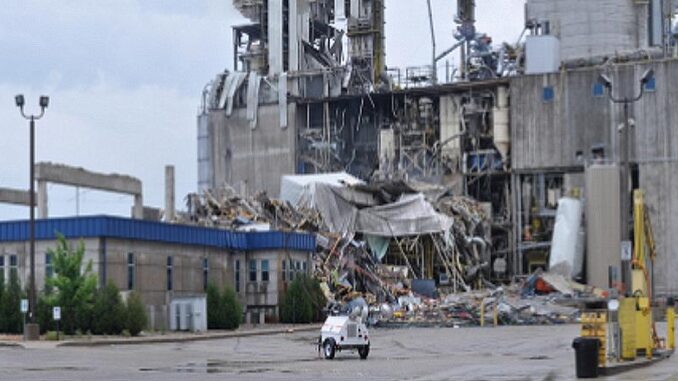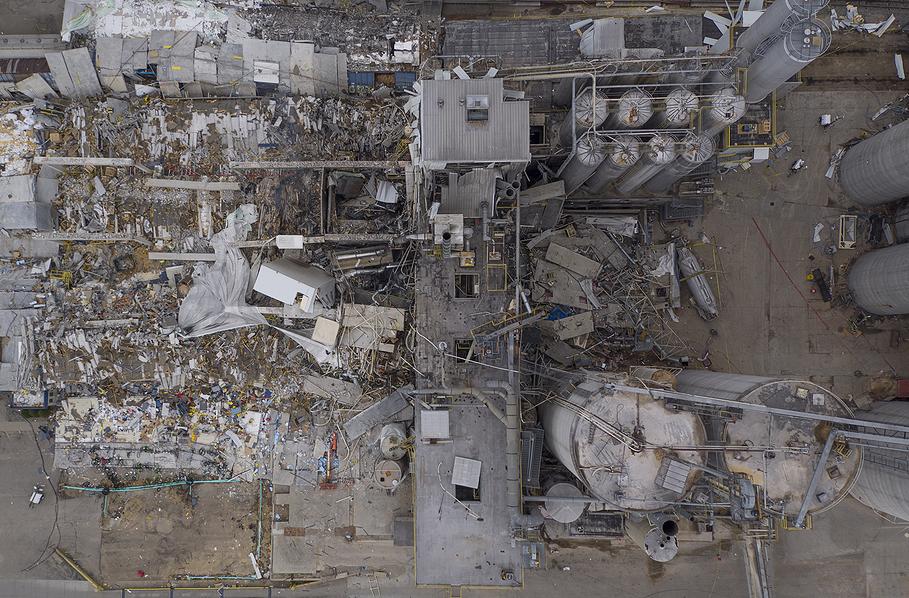
MADISON, Wisconsin, February 17, 2024 (ENS) – Six Didion Milling Inc. officials, including a corporate vice president and former food safety, environmental and operations managers, have been sentenced for their roles in a fatal explosion on May 31, 2017. Five workers died at the corn mill operated by Didion in Cambria, Wisconsin, 90 miles northwest of Milwaukee.
The U.S. Chemical Safety Board, CSB, has determined that the cause of the dust explosions and collapsed buildings was “the ignition of combustible corn dust inside process equipment, which transitioned to multiple explosions.”
“These defendants put Didion workers in grave danger and five people tragically lost their lives, devastating their families and their community,” said Attorney General Merrick Garland after sentencing by U.S. District Court Chief Judge James Peterson for the Western District of Wisconsin this week.
“Companies of all sizes should take note,” Garland said. Failure to comply with our country’s workplace safety and environmental laws can cost workers their lives and put individual corporate managers in federal prison.”
Didion Milling processes corn produced by some 800 Midwestern farm families. At least 27 million bushels of corn a year are turned into: corn meal, flour, and grits; industrial grade alcohol and alcoholic beverages, as well as an estimated 60 million gallons per year of ethanol. The ethanol process yields distillers grain, a high-protein animal feed, and corn oil, used to make biodiesel. Didion also contributes to famine relief meals for millions of families.
Didion Milling had its 50th anniversary in 2022. Dow and John Didion constructed their first grain elevator in Johnson Creek, Wisconsin in 1972. Didion grew to a total of eight locations in the 1980s and was the first Wisconsin grain company to transport grain by railroad.
But Didion Milling is far from a perfect company.
The Deadly Events of May 31, 2017
At around 10:30 on May 31, 2017, the night of the explosion, a fire originated in milling equipment at Didion’s corn mill in Cambria. The fire led to a series of explosions in the facility, killing five of the 19 workers on shift that night and seriously injuring others.
The explosions caused the collapse of multiple mill buildings and ultimately destroyed the facility, resulting in over $15 million in property damage, according to the U.S. Chemical Safety Board’s final report.
An investigation into Didion’s worker and food safety and environmental practices uncovered criminal violations of law attributable to both the company and senior officials.

Grain milling generates grain dust, which must be carefully managed for workplace safety, environmental, and food safety and quality reasons. Mill operators must adhere to rules and requirements intended to minimize hazards.
Grain dust is combustible, and mill operators need to maintain workplace safety through cleaning programs that remove dust accumulations from inside a mill.
Mill operators must also capture dust before it is emitted into the environment as particulate matter, a type of air pollutant.
Investigations of the explosion at Didion’s Cambria mill uncovered long-standing inadequate safety measures and improper handling of grain dust that Didion and its employees concealed through falsified documents and other obstructive conduct.
In October 2023, the Justice Department secured guilty pleas from the company, Didion, and company officials, as well as convictions against two more Didion officials. The Didion company pled guilty to falsifying its environmental and sanitation logs.
The U.S. Chemical Safety Board released its final report into the incident on December 6, 2023.
On Thursday and Friday, three defendants were sentenced to prison time for their crimes, and another three were sentenced to probation. Sentencing for an additional defendant is scheduled for March.
The company was sentenced in January 2024. Judge Peterson sentenced the company to pay $10.25 million in restitution to the victims of the May 2017 explosion and a $1 million fine, as well as to serve five years of probation with special conditions related to oversight of Didion’s operations.

“Didion Milling and its senior managers put corporate profits ahead of worker safety and environmental protection, with tragic consequences,” said Assistant Administrator David Uhlmann for EPA’s Office of Enforcement and Compliance Assurance. “The sentences imposed this week demonstrate that EPA and its law enforcement partners are committed to seeking justice for victims of environmental crime and their families.”
Derrick Clark, Didion’s vice president of operations at the time of the explosion, had nearly nine years of experience at Didion Milling in a variety of roles. He was sentenced to two years in prison, a year of supervised releas, and a $5,000 fine.
Clark was convicted in October 2023 of conspiring to falsify documents relating to dust cleaning practices in the mill and the operation of air pollution prevention equipment and making false compliance certifications as Didion’s “responsible official” under the Clean Air Act.
Clark was also convicted of obstructing the Occupational Safety and Health Administration’s investigation of the explosion at the corn mill by making false and misleading statements during a sworn deposition.

Former Environmental Manager Joseph Winch was sentenced to two years in prison, two years of supervised release and a $10,000 fine for conspiring to falsify Didion’s environmental compliance certifications.
Winch pled guilty to his conspiracy charge before trial, but the court’s sentencing took into consideration Winch’s effort to obstruct the trial of his co-defendants by committing perjury during his trial testimony.
Former Food Safety Superintendent Shawn Mesner was sentenced to two years in prison and a year of supervised release after being convicted in October 2023 of conspiring to commit fraud and to falsify Didion’s sanitation log.
Mesner’s falsification of the log was part of a scheme to mislead Didion’s customers and auditors about the company’s sanitation practices. The log also related to Didion’s compliance with worker safety protections, including the required cleanup of combustible dust, like fine grain dust, to prevent fires and explosions in grain handling facilities. The log purported to be a record of those dust cleanings. Mesner also provided untruthful testimony to OSHA during a sworn statement after the explosion.
Three former Didion shift superintendents: Anthony Hess, Joel Niemeyer and Michael Bright, were sentenced to probation and fines for falsification of Didion’s sanitation log. Nicholas Booker, a fourth shift superintendent, is scheduled to be sentenced in March.
Hess, Niemeyer and Bright pled guilty to felonies before trial and accepted responsibility for their actions. Hess was sentenced to a probationary sentence; Niemeyer was sentenced to a year of probation and a $1,000 fine; and Bright was sentenced to a year of probation.
“The Didion Milling dust explosion was a tragic incident resulting from a notorious industrial hazard. Individuals considering falsifying records are on notice that making false statements and attempting to obstruct our investigation are serious crimes and will be punished as such,” said Acting Secretary of Labor Julie Su. “The court’s sentences hold the company and these individuals accountable and send a clear message that cover-ups related to workplace safety will not be tolerated.”
Information on how to report suspected environmental violations may be found at the EPA Report a Violation webpage https://echo.epa.gov/report-environmental-violations.
Information on how to file a safety and health complaint about unsafe work conditions can be found at OSHA’s File A Complaint webpage http://www.osha.gov/sites/default/files/publications/OSHA3784.pdf. Information about how to file a complaint of retaliation for having engaged in workplace safety-related protected activity can be found at the same OSHA site.
Featured image: A view of the remains of the Didion Milling company’s corn mill in Cambria, Wisconsin, 90 miles northwest of Milwaukee, where five workers died in an explosion May 31, 2017. (Photo courtesy U.S. Chemical Safety Board)
© 2024, Environment News Service. All rights reserved. Content may be quoted only with proper attribution and a direct link to the original article. Full reproduction is prohibited.



